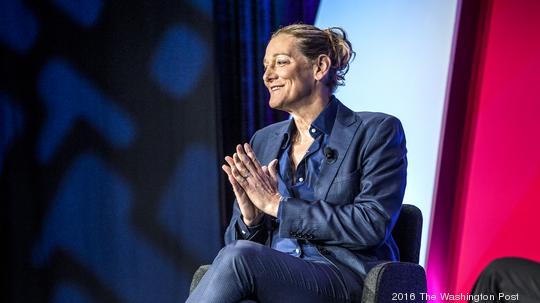
One of the D.C. region’s largest biotechs is working to be among the first publicly traded companies in its industry to convert to a public benefit corporation — an entity that must answer to both shareholders and society at large.
United Therapeutics Corp. (NASDAQ: UTHR) will seek approval from those shareholders at a Sept. 30 meeting to make the change in its certificate of incorporation, after which it would not only report financial results but also its effect on environmental, social and governance priorities on a regular basis. Company officials say the legal change will not alter its business or leadership strategy.
“This is a natural evolutionary step for us, and not meant to herald a change in our future growth strategy,” said John Hess, executive vice president for the 25-year-old Silver Spring company.
If its public benefit mission is to treat more patients, he said, that also serves its revenue model well. United Therapeutics develops and sells a line of drugs aimed at treating pulmonary arterial hypertension through a variety of methods, including injection, inhalation, infusion and tablets. It generated $825.6 million in total revenue in the first half of 2021, a 15% bump from the same period of 2020.
Hess said founder and CEO Martine Rothblatt will remain at the helm of the company, and its board makeup won’t change.
The move for the larger company follows a similar conversion to a public benefit corporation by its largest subsidiary, Lung Biotechnology, in 2015. That arm conducts the company’s growing research and development in organ manufacturing and xenotransplantation, or transplanting organs, cells or tissues from one species to another, to help increase the organ supply. As part of its work, the 120-person subsidiary developed genetically modified, pathogen-free pig organs that extended the animals' lives by more than six months, according to a new corporate responsibility report United Therapeutics released Friday.
Hess said he considers Lung Biotechnology’s conversion to a PBC as sort of a “pilot phase” for parent United Therapeutics, which was reluctant to make the switch at the same time. But now, “we know this corporate structure well,” he said. “Our board of directors had that six-year time frame to get comfortable with it.”
While the company acknowledges in federal filings such a switch can increase the risk of litigation, it sees it as a significantly bigger recruiting and retention tool for a generation that they say is as focused on social welfare as it is on its own financial welfare. “We expect millennials will soon be the biggest segment of our workforce,” Hess said. “We need to hire the best and brightest and these folks can go work and take their talents to a number of different places.”
United Therapeutics has talked about ambitious plans to double the size of the company, now at nearly 1,000 employees, 230 of them based locally. Hess said that also extends to its physical footprint as it plans more longer-term R&D programs that will require more real estate, some of it on land it already owns, but some on other parcels it would buy in the future — particularly if and when the company ventures further into the business of manufacturing and delivering transplantable organs for patients.
If it adopts the new corporate status, the company said it can also potentially attract more socially focused investors and investments as well.
For now, the biotech awaits word from the Food and Drug Administration in October on its application to start selling Tyvaso DPI, an inhaled dry powder version of its pulmonary hypertension drug. Between that and efforts to expand applications for its existing drugs, United Therapeutics hopes to beat out the increasing threat of generic drug competition that’s been slowly eating away at its potential revenue during the last two years. The local company has spent much of that time in legal battles against the generics manufacturers to keep their products from entering the market.



